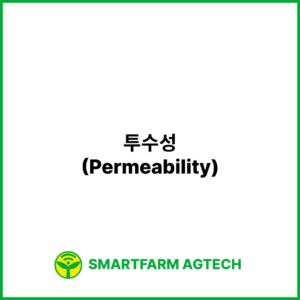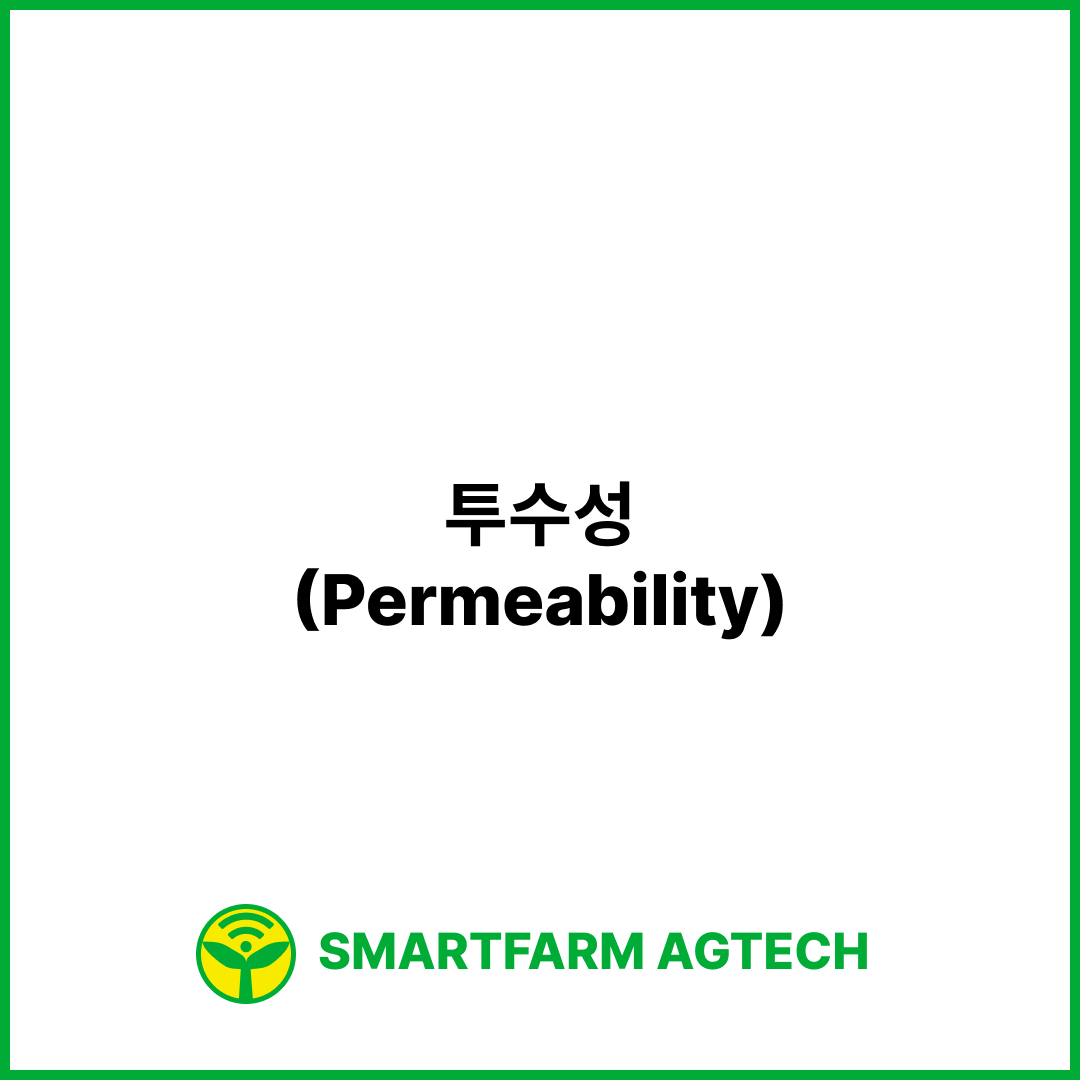투수성(Permeability) | 스마트팜피디아 (Smartfarm Pedia)는 스마트농업관리사 혹은 스마트농업전문가라면 알아야 할 내용 중에 하나입니다. 자세한 내용은 아래의 내용을 통해 확인해보시기 바랍니다.
투수성(Permeability) | 스마트팜피디아 (Smartfarm Pedia)
투수성(Permeability)

투수성은 토양이 물이 자유롭게 흐를 수 있는 능력을 나타냅니다. 이는 물이 토양의 구멍과 사이사이를 통과할 수 있는 정도를 측정하는 지표입니다.
투수성에 영향을 미치는 요소
토양 구멍 구조
토양의 구멍 크기, 형태, 배열은 투수성에 큰 영향을 미칩니다. 잘 연결된 큰 구멍은 물의 빠른 이동을 도와주며, 작거나 연결이 약한 구멍은 투수성을 낮춥니다.
토양 조성
모래, 실트, 진흙 및 유기물의 비율은 투수성에 영향을 미칩니다. 입자 크기가 큰 모래토양은 물이 자유롭게 흐르도록 해 투수성이 높습니다. 입자 크기가 작은 진흙토양은 투수성이 낮아집니다.
토양 조밀도
조밀화된 토양은 물의 이동 공간을 줄여 투수성을 감소시킵니다. 이는 자연적인 과정이나 인간의 활동으로 인해 발생할 수 있으며, 토양이 물을 흡수하고 전달하는 능력에 영향을 줍니다.
토양 수분 함량
투수성은 수분 레벨에 따라 변할 수 있습니다. 모든 구멍이 물로 채워진 포화된 토양은 물이 흐르는 데 저항을 일으켜 투수성이 낮아집니다.
중요성
농업
투수성은 농업에서 배수, 공기 통풍 및 뿌리 성장에 영향을 미칩니다. 적절한 배수 시스템을 갖춘 토양은 물에 잠기지 않고 식물 성장을 위한 최적의 조건을 제공합니다.
공학
시민 공학 및 건설 분야에서는 토양 투수성을 이해하여 기초 설계, 지하수 이동 평가 및 배수 시스템 계획을 수립하는 데 중요합니다.
환경 영향
투수성은 토양 내 오염물질의 이동을 제어합니다. 투수성이 높은 토양에서는 오염물질이 빠르게 지하수로 스며들어 수원을 오염시킬 수 있습니다.
지질학 연구
투수성은 암석이나 지층 내부에서 유체(유류 및 가스)의 이동을 결정합니다.
투수성은 토양 과학과 지반 공학에서 기본적인 속성으로, 농업, 건설 및 환경 관리와 같은 다양한 분야에서 중요한 역할을 합니다. 토양 투수성의 적절한 평가와 이해는 효과적인 토지 이용과 환경 보호에 필수적입니다.
Permeability
Permeability refers to the ability of soil to allow water to flow through its pores and interstices. It is a measure of how readily water can move through the soil matrix.
Factors Influencing Permeability
Soil Pore Structure
The type, size, and arrangement of soil pores significantly impact permeability. Well-connected and larger pores facilitate faster water flow, whereas smaller or poorly connected pores reduce permeability.
Soil Composition
Soil composition, including the proportions of sand, silt, clay, and organic matter, affects permeability. Sandy soils generally have high permeability due to their larger particle size, allowing water to move more freely. Clayey soils, with smaller particles, have lower permeability.
Soil Compaction
Compacted soils have reduced permeability as compacted particles leave less space for water to move. Compaction can occur due to natural processes or human activities, impacting the soil’s ability to absorb and transmit water.
Soil Moisture Content
Permeability can change with varying moisture levels. Saturated soils, where all pores are filled with water, often have reduced permeability as excess water creates resistance to flow.
Importance
Agriculture
Permeability influences drainage, aeration, and root growth in agricultural soils. Properly drained soils prevent waterlogging, ensuring optimal conditions for plant growth.
Engineering
In civil engineering and construction, understanding soil permeability is crucial for designing foundations, assessing groundwater movement, and planning drainage systems.
Environmental Impact
Permeability affects the movement of pollutants in soil. Contaminants can leach into groundwater more rapidly in highly permeable soils, potentially polluting water sources.
Geological Studies
Permeability is vital in geology, determining the movement of fluids like oil and gas through rock formations.
Permeability is a fundamental property in soil science and geotechnical engineering, playing a vital role in various applications, including agriculture, construction, and environmental management. Proper assessment and understanding of soil permeability are essential for effective land use and environmental protection.
참고)
- 스마트팜피디아 SMARTFARMPEDIA – 바로찾는 스마트팜 용어집 (발간등록번호 11-1543000-003389-0

